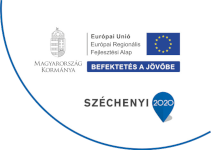
Around seventy PhD students delivered presentations at the 18-month Progress Report of the Centre for Translational Medicine. Presentations were given on pediatrics, gastroenterology, dentistry, gynecology, urology, endocrinology and other topics. All of them sought scientific answers to practical questions, which is the essence of translational medicine.
The 18-month Progress Report of the Centre for Translational Medicine was held at the end of January at Semmelweis University, with an opening speech by Dr. Alexander Schulze Wenning. At the centre, he is a Science Methodology Advisor and the PhD Coordinator of Year 2-3. In his presentation, he spoke about the strengths of the program and about their results. “We at the Centre for Translational Medicine are together because we want to bring science into healthcare. If you think about it, science is one of the most important things in our everyday lives. Without science, you would not know which protocol to use, which medicine to prescribe, or which surgery to choose. For this reason, our vision is to bring science into medicine.” Dr. Schulze Wenning reported that in this academic year, the students made 170 projects, of which 130 were meta-analyses, 17 clinical trial protocols, and 13 registry analyses. He mentioned that the registry analysis haven't been accepted yet, and encouraged students to keep up the work. He was also talking about clinical trials. “You produced much more clinical trial protocols than the last year, but yet we do not have accepted ones, so also try to speed up with the clinical trials. I also looked at your publications this morning and saw that 15 articles have been published by your class. And not just any articles. These are absolutely great articles. Eight of the 15 articles are in the top 10 percent worldwide, the best articles, and seven remaining are in the top quarter worldwide. So, we have eight D1 articles and seven Q1, and we are just after one and a half years. And these numbers will just grow continuously.”
Gastroenterology and pediatrics
After the opening speech, the three-day event began with presentations by members of the Pediatrics Group. There were 11 speakers from this group, each with exciting topics. Some topics were related to cancer, but there were also presentations focusing on antibiotic dosing in critically ill children, or on making neonatal care more effective. The next group was the Gastroenterology Group, from which 16 students gave presentations. Several presentations dealt with pancreatic diseases, but there were also topics that focused on the therapeutic strategies for Clostridioides difficile infection. There were also presentations on the effect of anti-inflammatory medication on venous thromboembolic risk in inflammatory bowel disease patients, or for example, on surgical aspects of colorectal cancer treatment.
Miscellaneous and dentistry
The second day of the Progress Report was dedicated to presentations by PhD students from the Miscellaneous Group and the Dentistry Group. The Miscellaneous Group had 9 students with topics on cardiology, psychiatry, radiology, and neurology. The topics were fascinating, for example, one of the speakers was talking about neurophysiological and neuroimaging markers of schizophrenia. There was also a speaker who conducted a multimodal analysis of functional connectivity changes in post-stroke patients with disorders of consciousness. One of the most interesting researches was the one that aims improving postoperative outcomes after cardiovascular surgery. The presentations of the Dentistry Group were also remarkable. From there, 10 students gave presentations, for example, one investigating the effects of diabetes mellitus on oral health. There was also an exciting topic on virtual surgical planning and intraoperative surgical navigation. There were also topics dealing with implantation or the effects of tobacco products on oral tissues.
Gynecology-urology & endocrinology, immunology & Covid
The final day of the Progress Report started with presentations from the Gynecology-Urology & Endocrinology Group. From this group, 13 students gave their talks. The topics here were also varied, inspired by practical work. There was, for example, one which focused on endometriosis-related pain relief, while another dealt with female aesthetic surgery and its clinical significance. There was also a presentation about investigating the association between oral contraceptive use and cancer risk; or an interesting study which explored the prognosis and survival of urinary bladder cancer. The six speakers of the Immunology and Covid group also presented exciting topics. One student was evaluating the efficacy and safety of natural products in evidence-based medicine, while another was investigating the efficacy and safety of adaptogens. There was also talk about exploring the biology of melanoma, and another about how artificial intelligence can be used in Covid-19 severity prediction.
(Szabó Emese)
